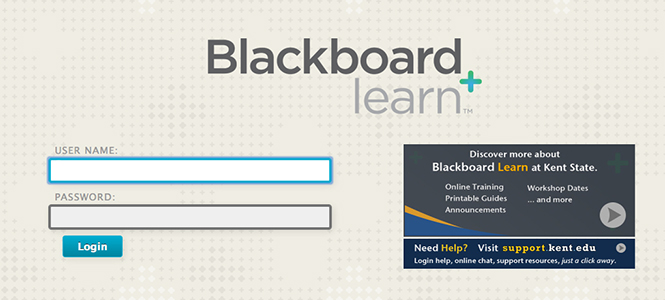Transition between online platforms is ‘learning’ process
October 1, 2012
Mary Beth Rollick, assistant professor of mathematical science, toyed around with Blackboard Learn in spring 2011 and posted discussion pages to her classes for her students to practice the material.
“Every week, I posted a challenge problem on my discussion board, and they answered it for a point,” she said. “They seemed to enjoy doing it, and they also helped me to learn how to do it because they would tell me: ‘It didn’t show up this week’ so I had to go and figure out what it was I had done wrong.”
This semester, since Kent State switched from using the course management system Vista to Blackboard Learn Rollick now teaches five courses using Learn but is still not completely comfortable with the system.
She said she downloads all her grades from Learn to an Excel spreadsheet.
“I usually use my own formula in coming up with grades,” Rollick said. “But in Blackboard Learn, it wants to do it for me. It thinks it knows what I want, but it doesn’t.” Jeffrey Pellegrino, associate director of Faculty Professional Development Center, said Blackboard, which bought the system WebCT that owned Vista, decided to stop building upgrades for Vista because it had its own tool, Learn.
“So they decided ‘Why do we have two different ones?’ Pellegrino said. “And they just said ‘Let’s combine. Let’s take the good stuff out of Vista but put it into our program called Blackboard, or Blackboard Learn, and we’re just going to stop supporting Vista.’”
The university looked at various course management systems during the past three years and decided to use Learn. Pellegrino said although the system looks different, it still has the basic calendars, discussions and quizzes but with some new possibilities.
“There’s these new mash-up tools, so we can mash-up — and mashing up just means I can suck in like a Flickr video or a NBC Learn video or photos into my course pretty easy,” he said.
Junior anthropology major Michelle Parise said the two sites are fairly similar but she had an easier time locating all her classes’ information on Vista than on Learn.
“From what I remember from Vista, you would just click on one thing, and all your stuff will be right there. You know all your classes, the notes,” Parise said. “But now you have to go click on Blackboard and then you have to go to each individual class and click on that.”
Rollick said it took time for people to adjust to Vista and will take time to adjust to Blackboard Learn, but she hopes the university finds a system that works for the long term.
“It’s good for students to access your material, and they can have immediate feedback on their grades,” Rollick said. “To learn something, new software, every couple years is very time-consuming.”
Cory Rolph, junior sports administration major, said he is adjusting to Learn but feels Vista was easier to communicate with professors about grades and assignments.
“The old Vista was easier because they posted grades right away,” Rolph said. “Teachers kept up with it more often.”
Pellegrino said some classes — such as an art studio — don’t use Learn because it isn’t necessary for students, but a wide spectrum of professors use Learn how they see best related to their course.
“There are a lot of people who use Learn just like they used Vista, but they only put their syllabus up there, or they only use the grade book, and they don’t develop good learning modules or use the discussion list or anything like that,” he said. “So there’s really low-end users, and then there are people, like, their entire course is within that system.”
John Updegraff, associate professor of psychology, said he used his own website last semester to avoid using Vista because he hated how clunky and slow it was. He said Learn is 100 times better than Vista.
“It’s a lot easier for professors to use, so I would imagine professors will be using it a lot more in the future,” Updegraff said.
Carol Steiner, associate professor of mathematical science, said she liked Vista even though it had its issues but said Learn has more issues right now, especially with points for assignments.
“It changed all the numbers for one of my assignments — it just changed everything,” Steiner said. “Now fortunately, when I went into it later on, they were back to their normal settings.”
Pellegrino said his office had open workshops to teach all faculty members the week before classes started to help with some transition issues,
Steiner was unable to attend informational sessions about Learn, but she said the transition to Learn is still a work in progress.
“I think it’s like all new things,” Steiner said “Eventually, we’ll figure it out.”
Contact Alicia Balog at [email protected].

























